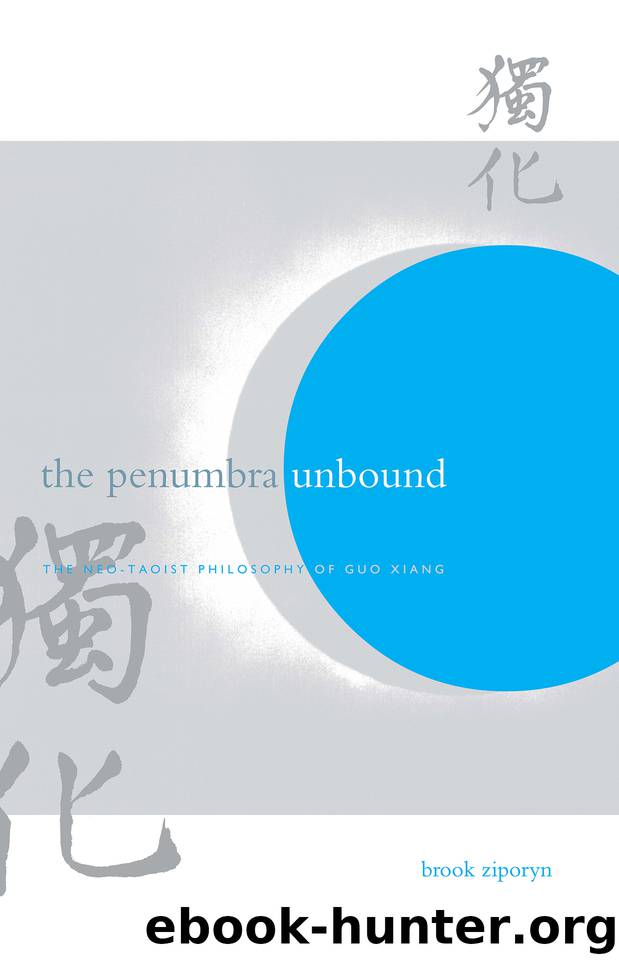The Penumbra Unbound: The Neo-Taoist Philosophy of Guo Xiang (SUNY series in Chinese Philosophy and Culture) by Ziporyn Brook

Author:Ziporyn, Brook [Ziporyn, Brook]
Language: eng
Format: epub
Publisher: State University of New York Press
Published: 2012-01-31T16:00:00+00:00
The Unification of Independence and Interdependence
T his brings us to the question of dependence and independence, of conditionality and unconditionality. For the relationship between things, or between the self and things, still seems to harbor a troubling ambiguity, or perhaps a paradox: this insistence that one become whatever one encounters seems to make one's identity completely dependent on those external things that one happens to encounter, and yet Guo repeatedly speaks of this as "unconditionality" (wudai ), a total independence of anything else. This seems to resemble the tension we just addressed, between following along with things and imitating them, and in what sense one remains "oneself," uninfluenced by external things, in either case. More broadly, we can see here the two sides of Guo's thought we have addressed so far—i.e., his repudiation of concern with traces, which seems to deny the efficacy and desirability of any mutual influence, on the one hand, and his advocacy of vanishing (into) things, which seems to call for the most thorough possible mutual influence and inter-action, on the other. From the tension between these two views of Guo's develops the tension between dependence and independence, and likewise from their inner connection and even mutual implication develops the resolution of this tension. This will be a crucial link in Guo's solution to the problems presented at the beginning of this book—i.e., how to unify the realms of spontaneity, or, independence, and the teaching of names; or, participation on social and political involvement. For the dialectical turn of Guo's mind is such that this unconditionality or independence he speaks of is not in any sense to be conceived of as the opposite of conditionality or dependence.
If we interpret this as a literal and complete denial of the efficacy of external causality we will be led into great difficulties, not only because it is such a counterintuitive position but also because Guo quite plainly and explicitly recognizes interrelations, and that things affect each other. "The generation of any thing or event always has that from which it comes (jie you suo you )," he asserts categorically, and he frequently invokes the principle of the mutual following or mutual necessity of things to each other (xiang yin , xiang xu , etc.). But if this is so, how are we to understand his constant refrain that things are "self-so," "born of themselves," "self-creating," "independent," "lone-transforming," and so on?
Various interpreters have addressed this problem in various ways. Fung Yulan says, "When Kuo Hsiang [Guo Xiang] said that everything spontaneously produces itself and is what it is, he meant that things are not created by any Creator. He did not mean that among things there are no relations one with another.... The idea is that when there are certain conditions or circumstances, certain things are necessarily produced. But they are not produced by any Creator or any individual." 81 Elsewhere he interprets the latter principle, of the spontaneous self-production of all things, to mean simply that "we cannot postulate with assurance that any one specific condition is the cause of any other specific condition.
Download
This site does not store any files on its server. We only index and link to content provided by other sites. Please contact the content providers to delete copyright contents if any and email us, we'll remove relevant links or contents immediately.
| Confucianism | Feng Shui |
| I Ching | Jainism |
| Karma | Shintoism |
| Sikhism | Tao Te Ching |
| Taoism | Tibetan Book of the Dead |
| Zoroastrianism |
The Tao of Physics by Fritjof Capra(2272)
Human Design by Chetan Parkyn(2068)
The Diamond Cutter by Geshe Michael Roach(2058)
Feng Shui by Stephen Skinner(1939)
The Alchemy of Sexual Energy by Mantak Chia(1855)
Tao Te Ching by Lao Tzu(1835)
365 Tao: Daily Meditations by Ming-Dao Deng(1616)
Tao Tantric Arts for Women by Minke de Vos(1592)
Sun Tzu's The Art of War by Giles Lionel Minford John Tzu Sun(1538)
Sidney Sheldon (1982) Master Of The Game by Sidney Sheldon(1513)
Buddhism 101 by Arnie Kozak(1508)
Karma-Yoga and Bhakti-Yoga by Swami Vivekananda(1491)
The Analects of Confucius by Burton Watson(1431)
The Art of War Other Classics of Eastern Philosophy by Sun Tzu Lao-Tzu Confucius Mencius(1425)
The Way of Chuang Tzu by Thomas Merton(1361)
Tao te ching by Lao Tzu(1357)
The New Bohemians Handbook by Justina Blakeney(1351)
The Sayings Of by Confucius(1312)
Bless This House by Donna Henes(1267)
